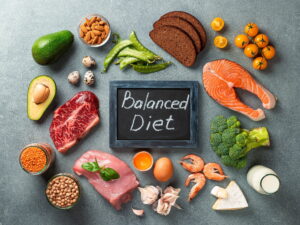The food we eat provides us energy, but how we eat can affect our energy levels throughout the day. Many people experience fatigue, lethargy, or difficulty concentrating, often attributing these effects to busy schedules or lack of sleep. While these factors are important, nutrition is one of the best ways to boost your daily energy levels. Eating the right foods at the right time can provide your body with long-lasting energy, prevent low energy levels, and help you stay alert. If you often feel worn out, making smart dietary changes can be key to maintaining your energy levels.
Starting the Day with a Balanced Breakfast
It’s often said that breakfast is the most important meal of the day, as it provides energy for the entire day. Skipping breakfast or eating too many sugary products like pastries can leave you feeling worn out and hungry in the morning. A healthy breakfast rich in protein, healthy fats, and complex carbohydrates can keep you energized all day long. Eggs, porridge, fruit yogurt, or whole-wheat toast with nut butter are all excellent starters. By providing your body with the right combination of nutrients early in the day, you can maintain a steady energy level without the fluctuations that can occur with caffeine or sugary foods.
Prioritizing Protein for Daily Energy
Protein is often considered a muscle-building aid, but it’s also crucial for maintaining steady energy levels. Protein slows the digestion of carbohydrates, preventing spikes and dips in blood sugar. Eating protein-rich foods throughout the day, such as lean meat, beans, lentils, eggs, or Greek yogurt, can help you feel full and maintain high energy levels. Protein also aids in the production of neurotransmitters, which influence your mood and alertness. Adding protein to every meal can be a significant help for those looking to avoid afternoon slumps.
Healthy Fats Provide Long-lasting Energy
Fats were once considered harmful, but research shows that good-quality fats are critical to preserving your energy levels. Foods like avocados, almonds, seeds, and olive oil are rich in essential fatty acids. These fatty acids support brain function and provide an energy boost. While refined carbohydrates burn quickly, high-quality fats take longer to digest and help maintain stable energy levels. Adding small amounts of healthy fats to your meals can promote a feeling of fullness and reduce the urge to snack. Choosing the right types of fat, rather than avoiding them entirely, can help you feel better every day.
Why Staying Hydrated is Crucial for Energy
Dehydration is one of the most common reasons people feel worn out, but many people don’t realize how important water is. Even mild dehydration can cause difficulty concentrating, affect physical performance, and leave you feeling fatigued. It’s important to drink enough water throughout the day so nutrients can reach your cells and produce energy. You can also prevent energy dips by drinking plain water, herbal tea, or brewed tea instead of sugary drinks and sodas. Staying hydrated keeps your body functioning properly and prevents dehydration from leading to fatigue.
Reducing Sugar for Stable Energy
Sugary snacks and drinks can give you a temporary energy boost but often lead to an energy crash. Excessive sugar intake causes your blood sugar to spike and then drop, making you feel worn out. One of the best ways to maintain stable energy levels is to reduce your sugar intake. Instead of craving sweets, eat fruit or dark chocolate in moderation. These foods are sweet but don’t have the side effects of sugar. Choosing nutrient-rich foods over sugary options can help you maintain more stable energy levels throughout the day.
Eating Smaller, More Frequent Meals
Some people find that smaller, more frequent meals maintain their energy levels better than three full meals. This approach ensures consistent nutrition and avoids long fasting periods that can lead to fatigue and overeating. Fruit with nuts, hummus with vegetables, or yogurt with seeds are all small, balanced meals that can keep your energy levels up. It’s important to choose snacks rich in protein, fiber, and healthy fats instead of processed foods.
Listening to Your Body’s Energy Signals
Not all fatigue is caused by lack of sleep; sometimes it’s a warning sign that your body needs more nutrition. Paying attention to how different foods make you feel can help you make better choices. For example, noticing whether a fast-food lunch makes you more tired than a lighter, more balanced meal can provide valuable insights. Understanding how to listen to your body’s hunger cues and energy patterns is crucial because everyone is different. Experimenting with different food combinations and timings can help you find the ideal way to maintain your energy levels throughout the day.
Integrating Nutrition with Lifestyle Habits
Nutrition is crucial for boosting energy, but combining it with a healthy lifestyle can be even more effective. Nutrition, regular exercise, good sleep, and stress management all work together to keep your energy levels stable. Exercise promotes circulation and burns calories, sleep promotes recovery, and stress relief can alleviate emotional fatigue. These factors, combined with a healthy diet, form the foundation for a more energetic and productive life. While nutrition is important, your lifestyle is just as crucial for maintaining your energy levels.
Conclusion
To have energy throughout the day, don’t rely on coffee or quick thirst quenchers. Instead, choose the right diet. A balanced diet with complex carbohydrates, protein, and healthy fats provides consistent energy, while drinking enough water keeps your body functioning properly. Reducing your sugar intake, eating smaller, more frequent meals, and paying attention to your body’s natural signals are simple and effective ways to maintain your energy levels. Everyone can achieve more energy, better focus, and better overall health through a balanced diet and a healthy lifestyle.
FAQs
1. Which foods provide the most energy?
Whole grains, lean proteins, fruits, vegetables, nuts, and healthy fats provide consistent energy and prevent fatigue.
2. How does drinking water affect your energy levels?
When you’re dehydrated, your focus decreases and your body functions less effectively, which can make you feel drowsy. To maintain a stable energy level, you need to drink enough water.
3. Is coffee a beneficial way to boost your energy?
Coffee can give you a short-term boost, but if you consume too much caffeine, you can experience a crash. A balanced diet can help you maintain your energy longer.
4. Why do I feel worn out after eating sugar?
When you eat sugar, your blood sugar rises quickly and then drops just as quickly. This can make you feel tired and hungry.
5. How many meals a day do I need to stay energized?
This varies from person to person, but eating small, balanced meals or snacks every three to four hours can help you stay energized throughout the day.




